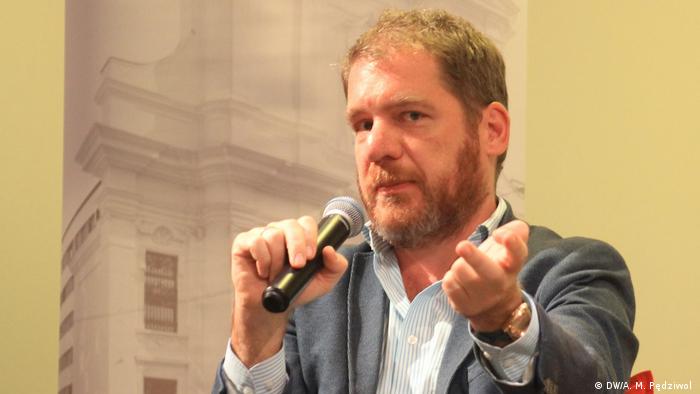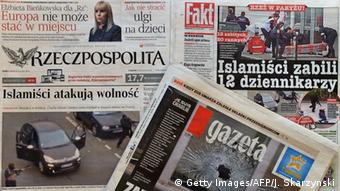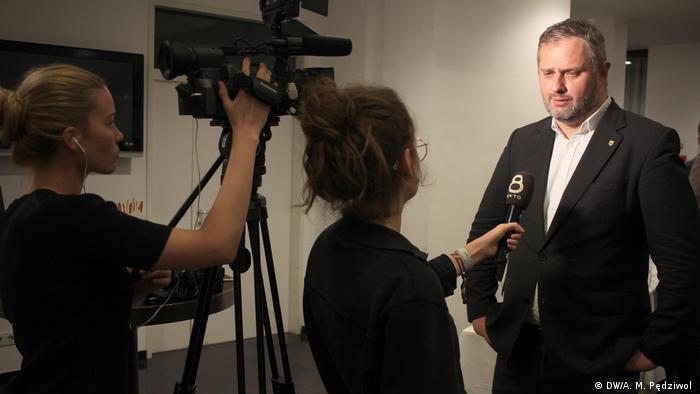Two journalists – a Hungarian and a Pole have been reported in Germany and Austria, of how unfree the media in their countries are now. Their trip began in Berlin and ended in Vienna, Albert-Schweitzer-Haus.

“The Germans heard our horror stories, the Austrians have heard horror stories about themselves,” summarizes Márton Gergely, the number two in the editorial office of the Hungarian weekly magazine HVG, his experiences of an extraordinary tour to the Deutsche Welle. “In Germany, we have found listeners who were interested, how bizarre are our both countries. The Austrians have tried, however, to find out what may be on them.” Not without reason, believes Bartosz Wieliński, head of the foreign policy Department at the Polish daily newspaper “Gazeta Wyborcza”, who travelled with Gergely both countries: “The FPÖ, if you could, would follow the Polish or Hungarian way.”
Your journey from Berlin, via Frankfurt, Munich and Heidelberg, Bregenz, Innsbruck and Graz, to Vienna. Both were invited by the editor of the Vienna weekly “Falter”. “Because we know the Bartosz and Márton longer. And we also know the stories from Poland and Hungary,” says the “Moths”-the chief reporter Nina Horaczek, which has also led to the moderation of the debates in Berlin and Vienna. “We thought even more people should learn,” she explains.
Hungary: The Same Media-Connected Landscape
These stories have taken on, such as the right-wing parties in control of the media. First of all, they brought the public-law television and radio stations under their control, which have been transformed into Propaganda machines. This happened in both countries.
In Hungary, takeover of private TV and radio stations, and Newspapers followed. The culmination of the closure of the government-critical, left-liberal-sheet “Népszabadság” was in the 8. October 2016 – the largest daily newspaper in the country, whose Deputy editor-in-chief Gergely was.

Márton Gergely: “….the Austrians have heard horror stories about themselves”.
The sheet that had belonged to the Swiss media house Ringier, was sold in 2014 to the company Mediaworks Hungary, which belonged to the Viennese company Vienna Capital Partners, the Austrian Heinrich Pecina. Within a few weeks after the closure of the “Népszabadság” sold Pecina Mediaworks with twelve regional leaves and a sports newspaper to the second-richest Hungary Lörinc Mészáros, a Confidant of Viktor Orbán.
Pecina was then in the famous Ibiza-Video, with the former FPÖ leader and Vice-Chancellor Heinz-Christian Strache in the main role. Strache all of the cost of its Offices, the government of Chancellor Shortly to fall and led to early parliamentary elections last Sunday, which ended with a debacle for the FPÖ.
Poland: The Ruling may have a Problem
“The story of Márton as his newspaper simply sealing was done is terrible,” says Wieliński, the stresses at the same time that his country is “thank God”, not as far as Hungary. The public media have been arranged by the government as “national media”, but the Private were able to defend their positions. “The media landscape in Poland is not so easy,” says Wieliński. “Because the foreign companies do not want to give up. Because these transactions bring profits. But also because there are important players who cannot be intimidated, like ‘Wyborcza’, for example,” says Wieliński.
At the latest since the coming to power of the PiS, four years ago, the Rulers announce a “Repolonisierung” of the private media with foreign owners, so their return in Polish hands. “But to date, they have presented no draft of such a law,” says the Polish Journalist, which means, in his opinion, that this attempt is unsuccessful.
The ruling party PiS has, in fact, a Problem. Their biggest opponent of the television TVN and “Gazeta Wyborcza” – the first independent newspaper in the former Eastern bloc, which appears to be under the leadership of Adam Michnik since the spring of 1989.

Poland’s ruling PiS party wants to repolonisieren the media “”.
TVN is in foreign hands, could be obtained, therefore, theoretically, back. But its owner, the US media company Discovery. To shake any attempt at it, would draw a tough response from Washington to. Since the PiS sees the United States as the main ally. The “Gazeta Wyborcza” in turn belongs to the company Agora, which is a Polish company and therefore hard to “” repolonisiert can be. “The government needs to be creative,” says Wieliński. And you is it.
Immediately after the acquisition, the PiS has deleted all subscriptions to the newspaper in the state institutions. The state-owned companies no longer advertise in “Wyborcza” also. From the convenience stores of the state oil Company PKN Orlen, the leaf has been banished.
The newspaper, however, do not starve. The decline in sales in the Print were made to pay in the digital area of betting. 200,000 Digital subscriptions Wyborcza “is” already at number 18 in the world, closely behind the French “Le Monde”.
But the government in Warsaw not on there. “In the PiS election program, a new authority is announced, to deal comprehensively with the questions of ethics and training of journalists. It was specifically said that the profession of journalism should be regulated, as in the case of Doctors and lawyers is regulated,” says Wieliński.
This should mean that a press chamber could be implemented, “which will ensure that their members – the journalists – to keep the law. The “Disobedient” are simply removed from their profession,” fear of the Pole.
Austria: the fall in the Ranking
“The Situation in Austria, Poland or Hungary are not comparable,” says the “Moths”-the chief reporter. But in the past one and a half years you could notice a tendency, “which is the Hungarian or Polish similar to that.”
Horaczek is reminiscent of the case of the speaker of the previous interior Minister, Herbert Kickl, the had sent an email to the police press offices, that a critical media should only receive the absolutely necessary information required, but nothing beyond that. “It was also a clear Signal”.

“The media landscape in Poland is not so easy,” says Bartosz Wieliński.
Another Signal is that of Austria crashed in the Ranking of press freedom by “reporters without borders” this year, five positions, from 11th to 16,. For comparison: Hungary slipped since the takeover of power by Orbán’s Fidesz party since 2010, of the 23. on the 87. Office, Poland 18. Position of 2015, to currently rank 59.
Gergelys and Wielińskis lecture tour that began in Germany. There are also such tendencies?
“I can only say what the ladies and gentlemen of the ‘Taz’ (“The daily newspaper)” tell us. On the part of the government, there are no restrictions, but what is it, are Asses Assault, for example, in the case of Pegida-up. There were already incidents where journalists had been threatened and attacked,” recalls Horaczek.
People can learn from it, if you want to
The development in Hungary and Poland but in the West, “at least as a warning” is observed. Horaczek would also wish to see that the new European Commission’s “watch a little more of it, because freedom of the press, freedom of expression, the fundamental and human rights are Central to a United Europe. If attacked, it is up to the task of Europe, and to be in solidarity.”
“If you reported on the Hungarian example, then people can learn from it, if you want it,” says Gergely, who sees himself in the role of a witness. “I’m a Journalist, I report, I analyze, I tell stories. On this trip, I have done the Same.”
“We try to make people sensitive,” adds Wieliński. What has been tested in Poland and Hungary, already, also, could be in other countries practice.